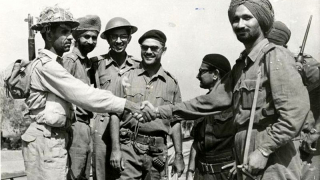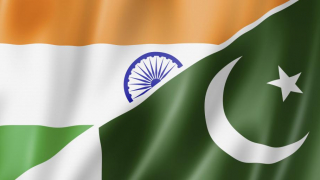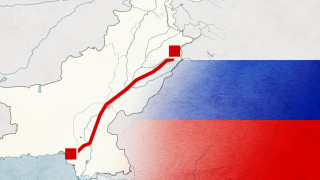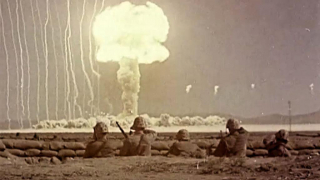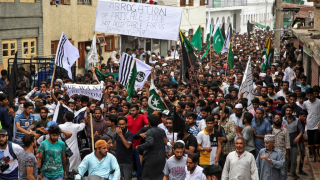The war rhetoric of India and the sense of reality
04.03.2019
American linguist, philosopher, cognitive scientist, historian, political activist, and social critic Noam Chomsky has stated in his book, Media Control: The Spectacular Achievements of Propaganda that “Propaganda is to a democracy what the bludgeon is to a totalitarian state.” The so-called Indian democracy and its ruthless establishment is using both the tools to befool the world but her all efforts have been drained by a well-designed and well-structured counter narrative of Pakistan. India’s public sphere was the first to erupt with war cries. “Mess with the best,” declared one aged Bollywood action hero on Twitter, “die like the rest.” Even the few commentators ostensibly wary of Prime Minister Narendra Modi succumbed to patriotic bloodlusts. India’s leading television channels vied with each other in urging more bombings and broadcasting transparently fake footage of the attack. Many Indians have found themselves ushered by digital media into a frantic realm of hyperreality -- one in which extreme feelings and continuously simulated experiences replace the obdurately dull facts of real life.
Due to the multifaceted internal conflicts, Indian Prime Minister Narendra Modi is between devil and the deep sea — his inability to manage Indian occupied Kashmir (IoK) and his prospects in the forthcoming elections, which has been rated as 50:50.
India has now drawn attention to itself with an Indian Air Force strike against a Pakistan to prop up war rhetoric, which met ridiculous catastrophe. The crisis, if it lasts, is seen helping incumbent Prime Minister Narendra Modi, who is trying to keep the Gandhis away from power through a beaten script of creating war hysteria and hate speech against Pakistan under the vague context of an attack on a Central Reserve Police Force convoy in Pulwama less than two weeks ago. Pakistan rejected on Tuesday (February 26) India's claim that it killed many militants in an air strike, branding it self-serving, reckless and fictitious. Pakistan officials have said that Indian warplanes did breach its airspace and drop a payload over Balakot in the country's northwest, but said there was no damage or casualties. Prime Minister Imran Khan denounced Indian statements that its fighter jets hit a militant camp in Pakistani town of Balakot as "fictitious". Imran's remark came after a meeting of the country's National Security Committee on Tuesday, hours after Pakistan said Indian aircraft dropped bombs on a deserted wooded area causing no casualties. Once again, the Indian government has resorted to a self- serving, reckless and fictitious claim and the statements from India were "for domestic consumption" in the run-up to elections.
The thwarted stunt by India risks putting regional peace and stability at grave risk. India has committed uncalled for aggression to which Pakistan has right to respond at the time and place of its choosing. The National Security Council of Pakistan strongly rejected (the) Indian claim of targeting an alleged terrorist camp near Balakot and the claim of heavy casualties. Pakistan Air Force on Wednesday struck down two Indian fighter jets intruding Pakistani airspace, in a valiant and befitting response to Indian aggression. Pakistan also took Indian pilot into custody. Meanwhile, Pakistan Army that shows the identity and related details of the captured Indian pilots has released a video. "My name is Wing Commander Abhinandan and my service number is 27981," the pilot says in a video statement. "I am a flying pilot and my religion is Hindu”, he continues. Wing Commander Abhinandan then goes on to say, "May I request for a little information, sir? Am I with the Pakistani army?" Meanwhile, Pak Army has also released pictures of the pilot's confiscated documents and weapons.
However, to decrease the tension, Prime Minister Imran Khan on Thursday announced to release Indian pilot Abhinandan Varthaman on Friday as a peace gesture. The prime minister was giving a policy statement at a joint sitting of both houses of parliament convened to discuss situation that has emerged after Indian intrusion of Pakistan's airspace . the sense prevails on side of Pakistan as India started blaming Pakistan within half an hour after Pulwama attack whereas after Indian aircraft violated airspace, Pakistan waited to ascertain the damages instead of reacting immediately. Pakistan showed responsibility despite knowing people's sentiment after India violated Pakistan's airspace. Indian people should think what made a youngster to become a suicide bomber in Kashmir. There is a need for retrospection and debate on Kashmir in India. India seems to blame the Pulwama attack on Islamic radicalization, which is not true. Indian deep state should analyze the phenomenon because it had nothing to do with Islamic radicalization as the suicide attacks are results of desperation and humiliation, better to be compared with Sri Lanka where Tamil Tigers carried out several suicide bombings. India should remember that if it takes action against Pakistan after any future incident in Kashmir, Islamabad will have no option but to retaliate.
Tension benefits neither Pakistan nor India.
The indigenous freedom struggle in IOK and the India’s inability to manage the state of affairs in Kashmir are the reasons behind its war rhetoric. Kashmir solution cannot be sacrificed on the altar of realpolitik and selective interpretation of documents by India, it is a matter of life and freedom of 12 million Kashmiris, and it is a human tragedy, which cannot go on. India’s frustration and threats of abrogation of Indus Water Treaty and other mutual agreements is blatant violation of International Law. This conduct is unsustainable in comity of nations and the international community and United Nations must take notice of it. One should note that truth is first victim in India-Pakistan conflict. In words of Pankaj Mishra an Indian essayist and novelist the cruel lesson from recent days for Modi and his reckless cheerleaders should be clear: They have catastrophically lost a sense of reality while replacing political processes — in Kashmir and with Pakistan — with image-making.







